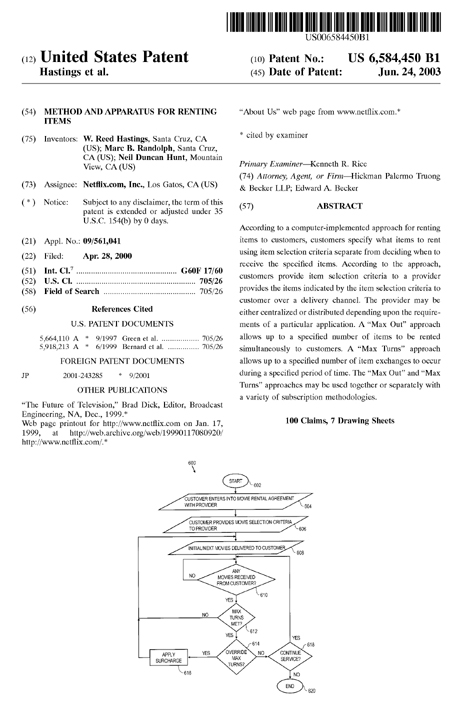Two "Fraudulent" Netflix Patents fuel antitrust class action lawsuit

A fellow named Dennis Dilbeck has sued Netflix, based on his perception that two of the company's Patents were granted without full disclosure of prior art- and that lack of disclosure has provided Netflix with a degree of protection that has enabled the company to "monopolize" the online DVD rental market and charge excessively high rental rates as a result.
As reflected in the filing, here's the gist of Dilbeck's case.
This is a national antitrust class action brought on behalf of a class of all persons and entities who subscribed to Netflix, Inc. (?Netflix? or ?Defendant?).
The class action concerns two patents obtained by Netflix: U.S. Patent No. 6,584,450 (the ?'450 Patent?) and U.S. Patent No. 7,024,381 (the ?'381 Patent?). The '450 Patent was issued on June 23, 2003 and the '381 Patent was issued on April 4, 2006.
As further alleged below, these Patents were obtained by fraud on the Patent Office and the fraudulent concealment of prior art. Because prior art anticipates some or all of the claims in the '450 and '381 Patents, and Netflix knew of this prior art, but failed to disclose it to the Patent Office, the '450 and '381 Patents are invalid and unenforceable. But for Netflix's fraud and fraudulent concealment, the Patent Office would have never issued either the '450 Patent or the '381 Patent.
3. Through its control of the '450 and '381 Patents, Netflix monopolized the online DVD rental market by deterring other competitors from entering that market. But for the threat of liability for infringing on the '450 and '381 Patents, there would be more competition (and, hence better services and lower prices) in the online DVD rental market. The '450 and '381 Patents have deterred and continue to deter competitors and delay the introduction of competition in the market for online DVD rentals and related subscription services. As a consequence of Netflix's exclusion of competitors and constraint of competition, Dilbeck and the other class members have paid supracompetitive online DVD rental subscription rates to Netflix.
4. To maintain its monopoly, Netflix has sued Blockbuster, Inc. (?Blockbuster?) for allegedly infringing on the '450 and '381 Patents by operating its Blockbuster Online rental service (?Blockbuster Online?), in case titled Netflix, Inc. v. Blockbuster, Inc., No. 06-2361 (N.D. Class Action Complaint Cal. Apr. 4, 2006) (the ?Netflix action?) before the Honorable William Alsup in the San Francisco Division. That proceeding both impaired Blockbuster Online's competitiveimpact on the market and has deterred other competitors from entering the online DVD rental market.
5. The Netflix Court denied Netflix's motion to dismiss Blockbuster's Walker Process counterclaim against Netflix under the Sherman Act. Netflix, Inc. v. Blockbuster, Inc., No.06-2361, 2006 U.S. Dist. LEXIS 63154 (N.D. Cal. Aug. 22, 2006). The Court denied Plaintiff's motion to intervene in the Netflix action on December 7, 2006.
6. Netflix's acts in obtaining and enforcing the '450 and '381 Patents to exclude and restrain competition constitute an unlawful trust prohibited under California's Cartwright Act. Netflix's use of the '450 and '381 Patents to delay, deter, and destroy competition in the online DVD rental market also established and maintained a monopoly prohibited under the Sherman Act.
7. Netflix's actions violate the Sherman Act (15 U.S.C. § 2), California's Cartwright Act (Cal. Bus. & Prof. Code §§ 16720, 16726), and California's unfair competition law (Cal. Bus. & Prof. Code § 17200). This lawsuit seeks remedies for consumers against Netflix's anticompetitive acts, including damages (and treble damages under the Sherman Act and the Cartwright Act), restitution, and other injunctive relief restraining Netflix from similar anticompetitive acts in the future under the Clayton Act (15 U.S.C. §§ 15, 26), the Cartwright Act (Cal. Bus. & Prof. Code § 16750), and the unfair competition law (Cal. Bus. & Prof. Code § 17203).
OK, now let us read the Abstracts of these two Patents, and see what they have to say about the respective inventions:
Patent 6,584,450, Method and Apparatus for Renting Items:
According to a computer-implemented approach for renting items to customers, customers specify what items to rent using item selection criteria separate from deciding when to receive the specified items. According to the approach, customers provide item selection criteria to a provider provides the items indicated by the item selection criteria to customer over a delivery channel. The provider may be either centralized or distributed depending upon the requirements of a particular application. A "Max Out" approach allows up to a specified number of items to be rented simultaneously to customers. A "Max Turns" approach allows up to a specified number of item exchanges to occur during a specified period of time. The "Max Out" and "Max Turns" approaches may be used together or separately with a variety of subscription methodologies.
Patent 7,024,381, Approach for Renting Items to Customers has an Abstract with the same language.
Prior art concealment seems kind of spurious to me in this case- but then again, that's what Patent Law judges get paid to decide.
